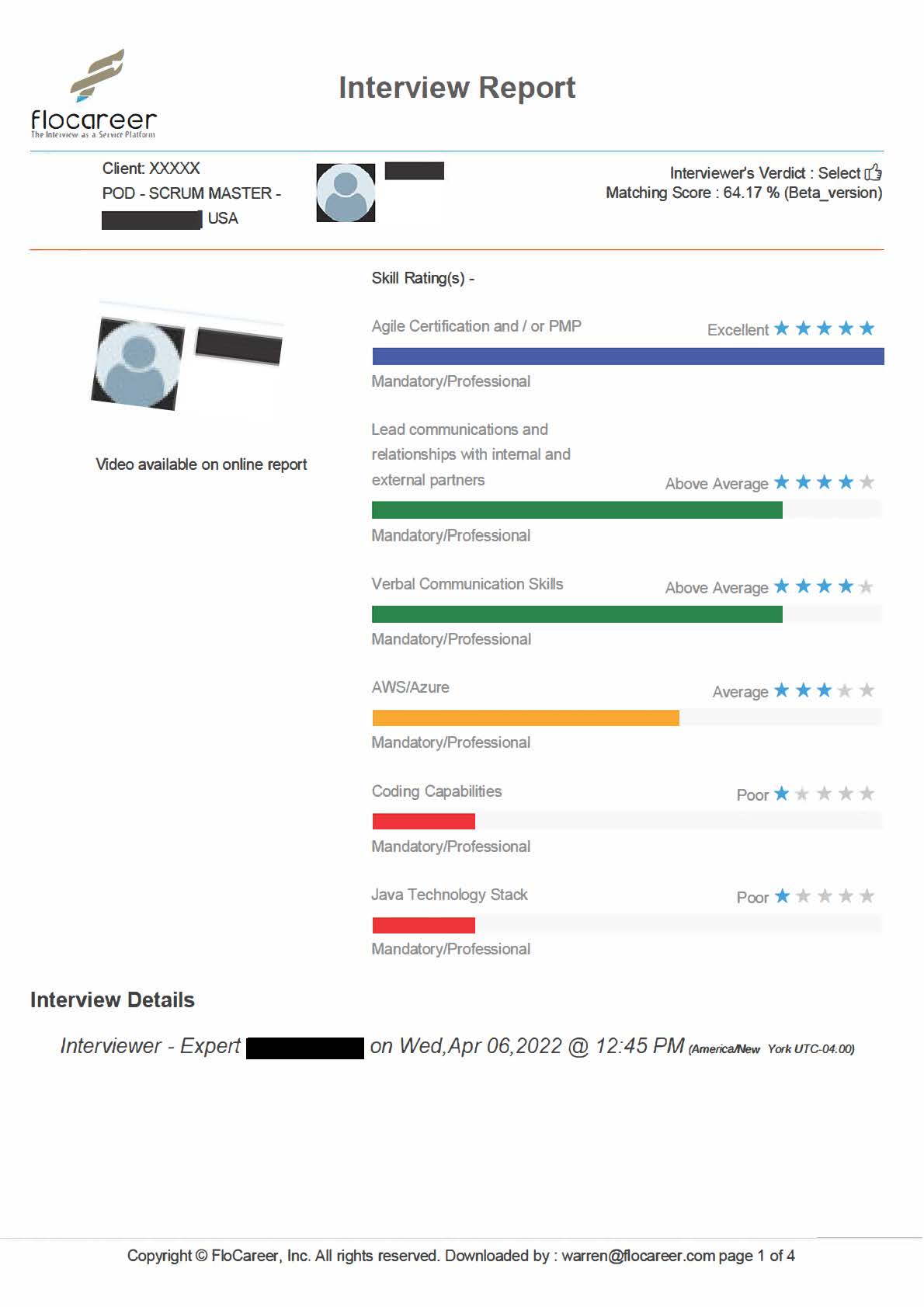Think back to the last time you conducted an interview. Did you conduct the interview intuitively, without a predetermined structure, choosing to go with the flow? If your answer is yes, then you probably didn’t use a set scoring system, basing your interpretation of answers on instinct and your inherent biases.
A structured interview strategy departs from such commonly adopted strategies. Instead, it is a systematic approach to interviewing where all candidates are asked the same questions and scored on a standardized grading system. According to research by McGill, structured interviews are far more effective than unstructured interviews, also doing away with various hiring biases.
This article will help you understand what are structured interviews, their benefits and drawbacks, and how you can use them to transform your hiring process.
What is a Structured Interview?
A structured interview is when the interviewer assesses the candidate using a pre-determined question bank. This question bank is carefully designed, keeping in mind the job role. The questions can be situational and behavioral, and a fixed scale is used to grade candidate responses. The flow of questions is also pre-decided to reduce the chances of bias and maintain standardization across the firm.
The key characteristics of a structured interview are it:
● Utilizes a standardized method.
● Is a quantitative method of evaluation.
● Can be easy replicated.
● Is sequential and the order of questions is fixed.
On the other hand, a traditional or unstructured interview is a conversation with no pre-set question bank or rating scale. Instead, it tends to be informal and focuses on developing a rapport between the interviewer and interviewee.
Join the Structured Interview Webinar on August 10th.
How to Conduct a Structured Interview?
Wondering how to conduct a structured interview? Read on to find out. The steps are as follows:
Step 1: Analyze the Job
You should prepare a list of skills that align with the specific requirements of the positions you are looking to fill: reflect on the nature of the position and what skills an ideal candidate would have. In addition to helping you create questions, this information can help you make a targeted job advertisement and decide on an appropriate salary. You should also conduct market research to understand what competitors are paying.
Step 2: Define the Job Requirements
Next, you need to define the abstract requirements, e.g., what do you mean by communications skills in the context of the specific role? Remove any reliance on intuition or assumptions and go into as much detail as possible. This data will also help you design a grading scale.
Step 3: Tailor Questions Suited for these Requirements
You should strike a balance between situational and behavioral interview questions. Make sure to include questions that evaluate whether the candidates have the desired attributes. If you are struggling to come up with questions or need assistance, you should consider reaching out to us at FloCareer. Our interviewers have conducted over 300,000+ interviews and have a 1.5 million+ question bank.
Step 4: Create a Grading Scale
Creating an objective grading scale is vital to minimize bias in decision-making. It is common practice to create a scale that ranges from one to five. Make sure that each level is accurately and precisely defined.
At FloCareer we use a grading scale of 1 to 5 with 5 being the highest a candidate can score. A candidate who scores a 5 is a master in the subject whereas a candidate who only scored a 1 hasn’t met expectations. After all the interviews you should add up each candidate's score and choose the ones who scored the highest. If two candidates are tied on the same number, you can choose the one who scored higher in the skillset that is most important for the role.
Below is an anonymized picture of how this report should look.

Step 5: Conduct the Interview
All that is left is putting your preparation into practice. While conducting interviews you should keep your scoring guide in front of you and continue marking candidates as the interview progresses. However, if you’re struggling with the process, we recommend outsourcing the interview process to a reputed platform like FloCareer. We have over 3000+ interviewers each with a wealth of experience on our platform. They’re determined and ready to help you succeed.
What are the Benefits of a Structured Interview?
While a structured interview strategy requires some preparation and practice to perfect, it comes with many benefits that make the process worth it. Here are some advantages of structured interviews:
Improve the Likelihood of a Beneficial Hire
Determining whether you have made a good hire can be difficult if you haven’t decided the parameters for success in any given role. However, since the structured interview provides clarity on measures of success, you can start judging candidates before they even step foot into your company. Rather than simply compiling a list of abstract qualifications, you must think about what you want a candidate to accomplish in a role before hiring them.
Assume a scenario where you want to hire someone to oversee the content published on the company blog. You want them to utilize external and internal writers while sticking to a set publishing schedule. Since you have clearly defined the expectations, you will know that you must focus on the candidates’ project management experience and time management skills.
A structured interview improves your chances of making a good hire since it enables you to outline what success in the specific position looks like and communicate it during the interview.
Planning for the Future
Recruiters often face a common dilemma of whether they should hire to fill the role’s immediate needs or plan for the future. Recruiters often feel compelled to look for candidates that fulfill the most urgent requirements; however, this may not be the best strategy.
Following a structured interview means that you have to confront what someone in the role will accomplish in the short and long term. This macro-perspective makes the hiring manager think about how someone would progress in the role and the scope for taking on increased responsibilities.
Structured interviews thus make it easier for hiring managers to think about long-term strategies regarding filling vacant roles instead of just hiring quickly to solve the most immediate problems.
Maintaining Objectivity
Without a transparent and systematic approach, it’s difficult to make an objective decision. Unfortunately, recruiters often hire candidates based on inherent biases and personal preferences, sometimes just picking candidates that are a reflection of themselves.
By defining a precise set of criteria to evaluate candidates, structured interviews help you make a fair and rational decision. By including assessments such as coding projects within the interview process, you can judge a candidate based on their skills rather than their degrees.

Image: https://unsplash.com/photos/iSYdI8padLM
Apart from being ethical business practice, this can also ensure that you aren't prone to discrimination lawsuits.
What are the Limitations of a Structured Interview?
An unstructured interview is more conversational and allows the interviewer to form a connection with the interviewee. In contrast, a structured interview can seem impersonal and cold, preventing candidates from genuinely expressing themselves. Though the interviewer can still find ways to create a welcoming atmosphere, the lack of instinct can make the atmosphere formal and clinical. However, the benefits of determining skill and ability to perform the job outweigh the importance of connection, particularly at the first stage of interviews.
Structured interviews require the preparation of a question bank and scoring scale, which can be a time-consuming process. However, once this is in place, interviews can take place faster as hiring managers can use the same rubric for large-scale evaluations.
Join the Structured Interview Webinar on August 10th.
How can you Revamp Your Interview Strategy with FloCareer?
A structured interview strategy has numerous benefits, and it can help you make better and more diverse hires quickly. By harnessing the power of technology and the gig economy, FloCareer helps you conduct effective interviews in as little as 48 hours!
Our Live Interview Platform provides interview structure curation, auto-scheduling, and a platform to test the candidate’s problem-solving skills with the help of images, presentations, or videos. With over six years of expertise, 150+ clients, and a team of 3,000+ interviewers, FloCareer is what you need to upgrade your hiring efforts and conduct better interviews.


